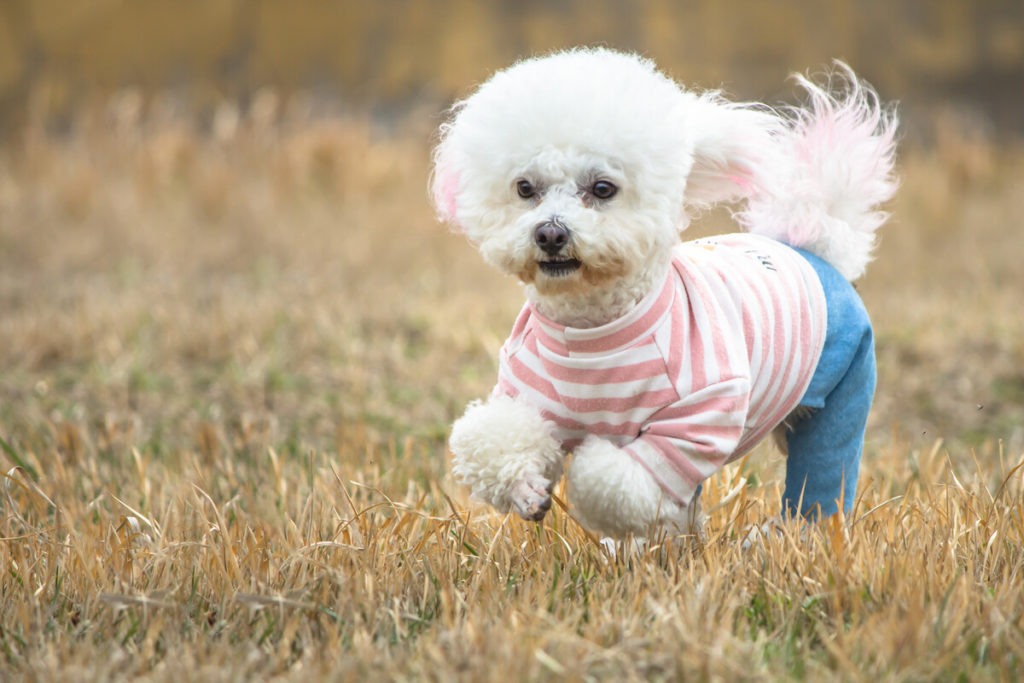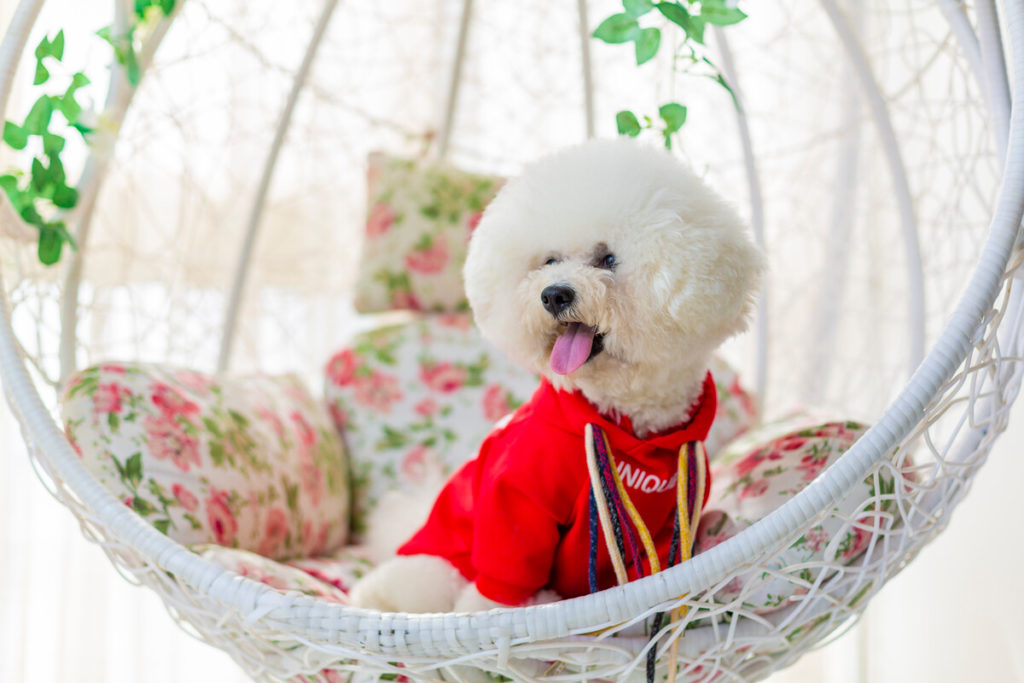The Pomeranian is a friendly little dog known for his bubbly personality and his fluffy white coat.
These dogs belong to the Non-Sporting group because they are typically kept as companion pets, though they can also be used for various dog sports. This breed remains fairly small, standing between 9.5 and 11.5 inches tall at maturity and weighing from 10 to 18 pounds as an adult. They are very healthy dogs as well, with a long lifespan of 15 years or more.
The Pomeranian was born to entertain which is part of what makes him such a great family pet. He forms strong bonds with family and is highly affectionate – he also tends to get along well with children and other dogs. Other great qualities of the breed including a low-shedding coat, low exercise needs, and an apartment-friendly size.
Though the Pomeranian is a healthy breed in general, the quality of your pom’s diet will determine his long-term health and wellness. Your pom requires a calorie-dense diet rich in protein and healthy fats with digestible carbohydrates and beneficial supplements.
Keep reading to learn more about your Pomeranian’s dietary requirements and to see our top 15 picks for the best dog food for Pomeranian.
Pomeranian Diet Requirements
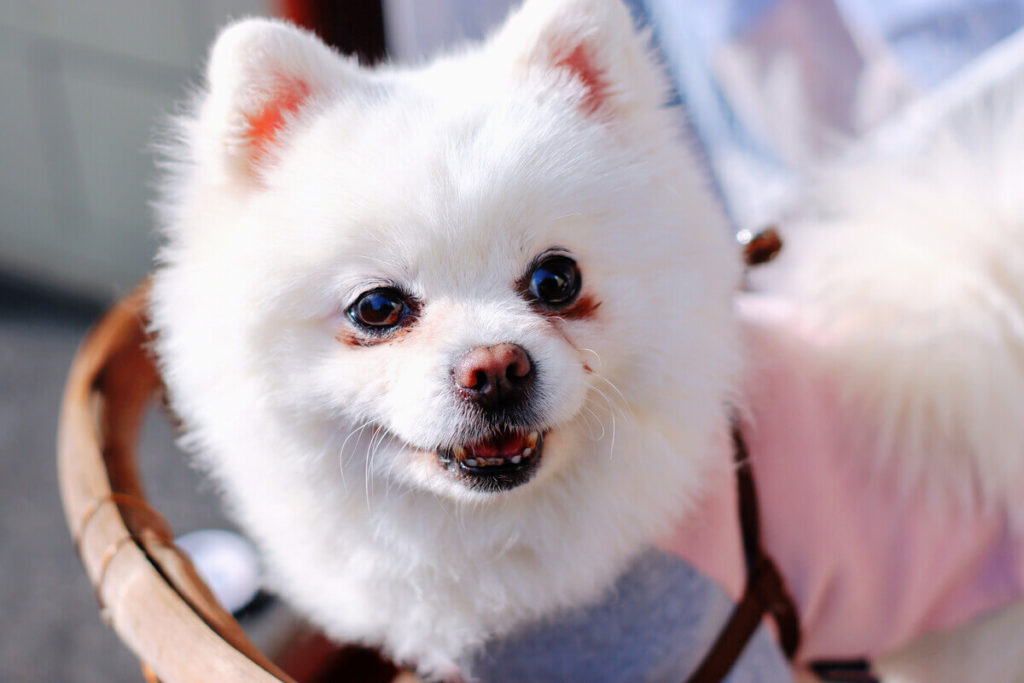
Your Pomeranian is not a strict carnivore, but most of his nutrition should come from animal sources like meat, poultry, and fish. Protein is the most important nutrient for any dog because it provides the building blocks of healthy protein and supports lean muscle mass. Look for a high-quality animal protein as the first ingredient in your Pomeranian dog food because animal proteins are complete proteins – this means they contain all 10 essential amino acids your pom needs.
Healthy fat is also an important component of a good Pomeranian dog food because it provides a concentrated source of energy as well as essential fatty acids for healthy skin and coat. Again, these should come from animal sources to ensure optimal bioavailability. your pom doesn’t have specific needs for carbohydrates, but they can provide energy, fiber, and essential nutrients. Just make sure they are highly digestible and consider avoiding grains due to the breed’s higher risk for food allergies.
- Puppy Pomeranian Food – As a puppy, your Pomeranian requires a minimum of 22% crude protein and 8% crude fat. As a small breed, however, your puppy has a fast metabolism so his needs for energy will be much higher – look for something closer to the 15% to 20% range. Most small-breed puppy foods contain extra fat to meet the breed’s high energy needs, so that’s a good place to start.
- Adult Pomeranian Food – Once your Pomeranian reaches 12 months of age, you should switch him to a small-breed adult diet. He needs a minimum of 18% protein and 5% fat, though more fat is usually better since you’ll need to sustain his fast metabolism. Most adult Pomeranian dogs need between 30 and 40 calories per pound of body weight, so you can also choose a regular adult diet if it has adequate fat content and fits in with your pom’s calorie needs.
- Senior Pomeranian Food – When your Pomeranian reaches 7 or 8 years of age, he starts to become a senior and his metabolism may begin to slow down. To prevent him from gaining an unhealthy amount of weight and putting extra strain on his joints, reduce the amount you feed him by a little bit or switch him over to a small-breed senior dog food recipe.
The simplest way to ensure that your Pomeranian dog’s nutritional needs are met in every life stage is to start with a small-breed dog food. These recipes are formulated with an optimal balance of protein and fat to support lean muscle mass while also fueling your pom’s fast metabolism.
Special Dietary Considerations For Pomeranian
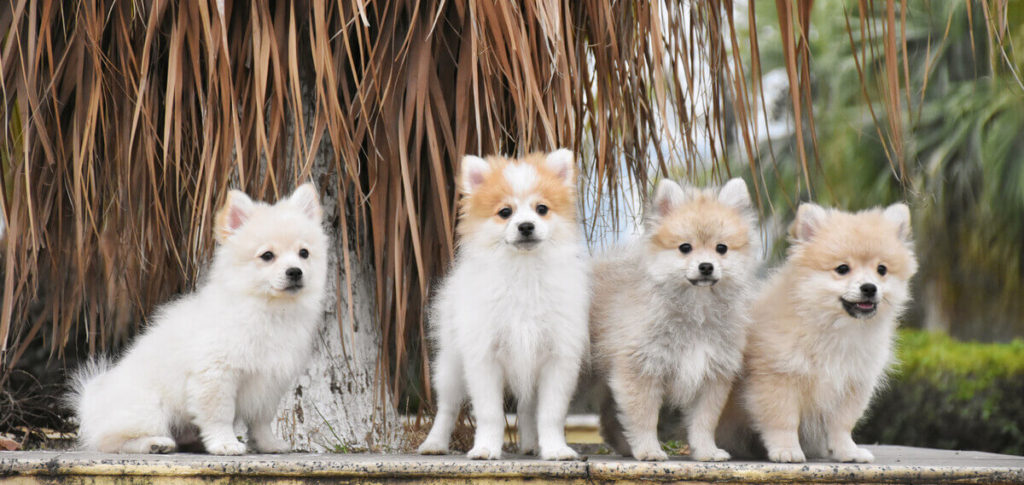
The Pomeranian has a long lifespan around 15 years which is fairly standard for breeds of his size. Unfortunately, he is prone to a number of hereditary health problems that could limit his lifespan. Most of the health problems to which the breed is prone are musculoskeletal, though these dogs may also be prone to certain eye problems and allergies.
Here is a quick list of the health problems to which the Pomeranian may be prone:
- Allergies
- Bladder Problems
- Dental Problems
- Epilepsy
- Hemolytic Anemia
- Hip Dysplasia
- Juvenile Cataracts
- Legg-Calve-Perthes Disease
- Patellar Luxation
- Vaccination Sensitivity
Let’s take a closer look at some of these health problems.
Generally speaking, musculoskeletal issues are much more common in large breeds than in smaller dogs, but the Pomeranian is prone to several hereditary joint problems. Hip dysplasia is characterized by a malformation of the hip joint which causes the head of the femur bone to pop in and out of place. It can lead to progressive joint damage and eventual lameness. Patellar luxation occurs when the kneecap slips out of place, causing pain and progressive damage. Legg-Calve-Perthes Disease affects the femoral head as well, leading to degeneration of the bone due to inadequate blood supply.
Another major problem among Pomeranian dogs is dental problems. Smaller breeds are more highly prone to dental problems than larger breeds due to their anatomy. Their mouths are smaller which leads to overcrowding which can contribute to dental disease. Feeding your Pomeranian the best high-quality dry dog food is a good way to reduce the risk because the crunchy kibble will help scrape plaque and tartar off his teeth while wet food may simply get stuck in the teeth.
Allergies are another problem for the Pomeranian breed. Though this breed has a low-shedding coat which reduces the risk for triggering allergies in people, these dogs have a higher risk than many breeds for developing allergies themselves. One problem is that these dogs are much more sensitive to vaccinations than other breeds, so it is not uncommon for them to have an allergic reaction to a vaccine. More commonly, however, Pomeranian dogs exhibit allergies to food ingredients like corn, wheat, and soy as well as common proteins like beef and pork. Feeding your Pomeranian a limited ingredient diet or a grain-free diet may help reduce the risk for triggering these allergies.
Pomeranian Feeding Chart
When it comes to feeding your Pomeranian, know that you’ll need to make some changes over the course of his life. As a puppy, your Pomeranian needs a steady influx of calories to sustain his growth with plenty of protein to support muscle development. As such, you may want to feed your puppy three or four meals throughout the day or simply keep his food bowl full.
Once your Pomeranian reaches his adult size, you can switch to a small-breed adult recipe. These recipes are protein-rich to support healthy muscles with higher fat content for energy. Feed your pom three meals evenly spaced throughout the day, following the feeding recommendation on the chart to determine exactly how much to feed your pom. Remember, that recommendation is for the whole day, so you’ll need to divide it by the desired number of meals.
As your Pomeranian gets older, you may notice him slowing down. If he becomes less active, it means that he needs fewer calories, so you can either feed him a little less at each meal or switch to a senior dog food recipe. Again, refer to the feeding recommendation on the package according to his age and body weight to see how much to feed him.
Best Dog Foods For Pomeranians
Now that you’ve developed a stronger understanding of your pom’s nutritional needs, you’re ready to start shopping. Remember, you should start with a small-breed dog food made with wholesome natural ingredients, particularly quality animal proteins, healthy fats, and digestible carbohydrates. Here are our top 15 picks for the best Pomeranian dog food:
Nature’s Variety Instinct Raw Boost Small-Breed Duck Recipe

Overall Best Food for Pomeranian: If you want to feed your Pomeranian the best of the best, try this Nature’s Variety Instinct Raw Boost Small-Breed Duck Recipe. This formula consists of high-protein kibble mixed with freeze-dried raw bites to ensure optimal nutritional quality and unbeatable flavor. Formulated specifically for small breeds, this recipe is rich in premium animal protein from fresh duck and duck meal with healthy fats from chicken fat and coconut oil. It contains a whopping 36.5% crude protein and 16% fat with 4.5% dietary fiber. You’ll also be glad to know that it is supplemented with chelated minerals and fresh fruits and veggies for nutritional balance and probiotics for healthy digestion.
- Pros: Made with all-natural ingredients, premium animal protein from duck, rich in healthy fats, supplemented with chelated minerals and probiotics, fresh fruits and veggies
- Cons: Contains chicken ingredients (some dogs may be sensitive), may be too high in protein for some dogs (dogs with kidney problems)
Whole Earth Farms Grain-Free Small Breed Recipe

Most Affordable Food: For a high-quality recipe that won’t break the bank, try this Whole Earth Farms Grain-Free Small Breed Recipe. It features chicken meal as the main ingredient which is a highly concentrated source of protein and a natural source of glucosamine and chondroitin for joint support. This recipe contains nutrient-rich chicken fat as the main source of essential fatty acids, providing a total of 13% protein and roughly 350 calories per cup. Designed specifically for small-breed dogs, this recipe provides the optimal balance of protein and fat with grain-free carbohydrates for fiber and essential nutrients. This recipe also contains chelated minerals for optimal nutrient absorption and probiotics for digestive support.
- Pros: Affordable price, concentrated source of animal protein (chicken meal), rich in essential fatty acids, dried fruits and vegetables, grain-free carbohydrates, chelated minerals, probiotics
- Cons: Some dogs may be sensitive to chicken ingredients
Taste Of The Wild Appalachia Valley Small Breed Grain-Free Recipe

Most Popular Food: If you’re not sure what the best dog food for Pomeranian dogs is, why not choose a recipe that other dog owners love? This Taste of the Wild Appalachia Valley Small Breed Grain-Free Recipe is extremely popular and for good reason. It is specially formulated for small breeds, made with a wealth of premium animal protein and healthy fats with grain-free carbohydrates for support. This recipe features real venison as the primary ingredient with other supplemental proteins like lamb, duck, egg, and ocean fish. It is made with only high-quality, all-natural ingredients including fresh fruits and vegetables which provide antioxidants and nutritional support.
- Pros: Real venison as the main ingredient, several supplemental proteins, grain-free carbohydrates, provides 32% protein and 18% fat, fresh fruits and veggies, chelated minerals, probiotics
- Cons: Main source of fat is plant-based, contains some plant protein (pea protein)
Canidae Grain-Free PURE Petite Small Breed Lamb Formula

Best Food for Pomeranian with Allergies: If your Pomeranian suffers from food allergies, you may want to consider a limited ingredient diet or a grain-free diet – or both. This Canidae Grain-Free PURE Petite Small Breed Lamb Formula fits the bill for being made with a limited number of main ingredients (8) and for being grain-free. Plus, it features a single source of novel protein (lamb) to further reduce the risk for food allergies and sensitivities. This recipe is made with grain-free carbohydrates like peas and lentils with canola oil for healthy fats and freeze-dried lamb for a boost of nutrition and flavor.
- Pros: High-quality kibble with freeze-dried raw coating, single source of premium animal protein, grain-free carbohydrates, rich in natural flavor, chelated minerals, probiotic supplements
- Cons: Very expensive to feed as a staple diet, main source of fat is plant-based (canola oil)
Wellness Simple Limited Ingredient Grain-Free Small Breed Salmon & Potato Dog Food

Best Food for Pomeranian with Sensitive Stomachs: Even if your Pomeranian doesn’t have food allergies, many dogs of this breed have sensitive stomachs and require a highly digestible dog food. This Wellness Simple Limited Ingredient Grain-Free Small Breed Salmon & Potato Dog Food is a great choice because it is grain-free and made with high-quality, natural ingredients. This formula features fresh salmon and salmon meal as the top two ingredients, making it a rich source of protein as well as healthy fats. It contains grain-free carbohydrates like peas and potatoes with canola oil and flaxseed to ensure the proper balance of omega-3 and omega-6 fatty acids. You’ll also be glad to know that it contains plenty of beneficial supplements but is free from artificial additives.
- Pros: Rich source of animal protein and fat, grain-free carbohydrates, made with a limited number of ingredients, supplemented with chelated minerals and probiotics, highly digestible
- Cons: First source of fat is plant-based (canola oil), may be too high in fiber for some dogs
3 More Top Rated Recommended (5 Star) Pomeranian Adult Foods
Nulo Freestyle Grain-Free Small Breed Salmon & Lentils Recipe

Another excellent example of high-quality nutrition formulated uniquely for small breeds is this Nulo Freestyle Grain-Free Small Breed Salmon & Lentils Recipe. This formula features deboned salmon, turkey meal, and menhaden fish meal as the top three ingredients, providing a whopping 31% protein and 17% healthy fats. It is naturally grain-free, relying on red lentils and sweet potatoes for carbohydrate support with dried fruits and vegetables for nutritional balance.
Castor & Pollux Organix Grain-Free Small-Breed Recipe Dry Food

When it comes to nutritional quality, it is hard to do better than an organic dog food like this Castor & Pollux Organix Grain-Free Small-Breed Recipe Dry Food. This recipe features all-natural, organic ingredients that will deliver optimal nutrition and digestibility for your Pomeranian. It is free from artificial additives and made with premium ingredients like organic chicken, organic sweet potatoes, and organic coconut oil. It also contains chelated minerals and probiotics.
Halo Holistic Wild Salmon & Whitefish Grain-Free Healthy Weight Small-Breed Recipe

For high-quality nutrition that nourishes your Pomeranian’s body from the inside out, try this Halo Holistic Wild Salmon & Whitefish Grain-Free Healthy Weight Small-Breed Recipe. This recipe features all-natural ingredients including wild-caught salmon, non-GMO garden-fresh veggies, and nourishing oils. It contains no artificial additives and is naturally grain-free to ensure optimal nutrition and digestibility.
3 More Top Rated Recommended (5 Star) Pomeranian Puppy Foods
Blue Buffalo Wilderness Grain-Free Puppy Chicken Recipe Dry Food

Your Pomeranian puppy need a protein-rich diet to support his growth and development with plenty of healthy fats for energy. This Blue Buffalo Wilderness Grain-Free Puppy Chicken Recipe Dry Food features protein-rich chicken as the main ingredient which provides for those needs in addition to being a natural source of joint-supporting glucosamine and chondroitin. The primary fat in this recipe is nutrient-rich chicken fat with flaxseed and fish oil to ensure a balance of omega-3 and omega-6 fatty acids.
Wellness CORE Grain-Free Small Breed Puppy Deboned Turkey Recipe

If your Pomeranian puppy has a sensitive stomach, this Wellness CORE Grain-Free Small Breed Puppy Deboned Turkey Recipe might be a good option. Not only is it grain-free, but it is supplemented with prebiotics and probiotics to ensure healthy and regular digestion. This recipe features deboned turkey and turkey meal as the primary proteins with chicken fat for essential fatty acids and salmon oil for omega fatty acids. It also contains fresh fruits and vegetables as natural sources for key nutrients.
Holistic Select Small & Mini Breed Puppy Anchovy, Sardine & Chicken Meals Recipe

Specially formulated for small and mini breed puppies, this Holistic Select Small & Mini Breed Puppy Anchovy, Sardine & Chicken Meals Recipe would be a good choice for your Pomeranian. It features several premium animal proteins with nutrient-rich chicken fat for essential fatty acids and salmon oil for omega fatty acids. This recipe contains fresh fruits and veggies as well as chelated minerals to ensure optimal nutrient absorption with probiotics for healthy digestion.
2 More Picks For Senior Pomeranian Foods
Wellness Complete Health Small Breed Senior Deboned Turkey & Peas Recipe

If you’re looking for a senior dog food you can rely on to meet your Pomeranian’s changing nutritional needs, count on this Wellness Complete Health Small Breed Senior Deboned Turkey & Peas Recipe. This recipe is entirely grain-free and free from artificial additives, so you know it will be gentle on your pom’s stomach. It features deboned turkey and chicken meal as the main ingredients with digestible carbohydrates like brown rice, peas, and oatmeal. It also contains chicken fat as a nutritious source of essential fatty acids with fresh fruits and vegetables to provide vitamins, minerals, and antioxidants. It is also supplemented with chelated minerals and probiotics.
Now Fresh Grain-Free Small Breed Senior Weight Management Recipe
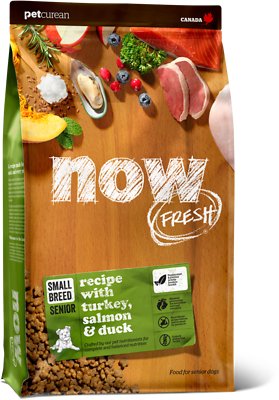
If you have a decent budget to work with, this Now Fresh Grain-Free Small Breed Senior Weight Management Recipe is an excellent choice for a senior Pomeranian. This recipe features turkey, salmon, and duck to provide optimal levels of protein and fat to support your pom’s lean muscle mass while also meeting his needs for energy. This recipe is supplemented with prebiotics and probiotics for healthy digestion and contains plenty of antioxidants for healthy immunity and nutritional balance.
Related: Best Dog Shampoos for a Pomeranian
Our FAQ And Pomeranian Feeding Guide
While picking a high-quality dog food for your Pomeranian is very important, you also need to think about how you’re going to keep it fresh and how you’ll feed your pom. Choosing a dog bowl may seem like a simple decision but there are a variety of factors to consider. First and foremost, you want it to be durable and resistant to scratches – scratches can harbor bacteria that might make your pom sick. Ceramic bowls and stainless-steel are durable and easy to clean.
In terms of keeping your pom’s food fresh, you want to limit exposure to air once the bag is opened. The best thing to do is place the entire bag in an airtight container and store it in a cool, dry location. The inside of a dog food bag is treated to keep the product fresh, so don’t just pour the food into a new container because you’ll lose those benefits.
And now, here are the answers to some of the most commonly asked questions about feeding a Pomeranian:
How much food should I feed my Pomeranian? – The amount you feed your Pomeranian varies depending on several factors. First and foremost, his age and body weight. Growing puppies need to eat more and more often than adults to fuel their growth and development while senior dogs may need to eat less to prevent obesity. Generally speaking, you should feed your pom about 1 cup of food per day, depending on the calorie content. Check the feeding recommendations on the package according to your pom’s age and body weight then divide that number by the desired number of daily meals.

How many times a day should I feed my Pomeranian? – When your Pomeranian is a puppy, you should feed him three to four meals per day or simply keep his food bowl full. Once he reaches his adult size, around 6 to 12 months, you can switch to an adult recipe and drop down to three meals a day. When your pom becomes a senior around 7 to 8 years, reevaluate and decide whether you need to reduce the amount you feed him or switch to a senior recipe.
What kind of food do Pomeranian eat? – All dogs require a healthy and balanced diet made with high-quality ingredients, but the quality of those ingredients is especially important for the Pomeranian. These dogs are prone to food allergies and sensitivities, which are more likely to be triggered by low-quality ingredients and artificial additives. Look for an all-natural dog food made with whole food ingredients like premium animal proteins, healthy animal fats, and digestible carbohydrates such as vegetables, beans, and legumes. If you can afford to feed your pom a raw, dehydrated, or freeze-dried dog food then you should! If not, choose a high-quality dry food that meets the standards previously discussed.
What vegetables are good in a Pomeranian food? – Though your Pomeranian is primarily a carnivore, his body has the ability to digest some plant foods including fresh vegetables. Vegetables are a grain-free source of carbohydrates for dogs and they are rich in dietary fiber to support healthy digestion. They act as a natural source for key vitamins and minerals in dog food but can also be a healthy snack. Here are some of the best vegetables for dogs:
- Asparagus
- Broccoli
- Brussels sprouts
- Carrots
- Cauliflower
- Cucumber
- Green beans
- Peas
- Pumpkin
- Spinach
- Sweet potato
- Zucchini
Before feeding your pom fresh vegetables as a snack, make sure they are properly washed to remove any traces of pesticides. You should also be careful to feed very small amounts at first until you see how well your pom tolerates them. Like any snack, veggies should make up no more than 10% your pom’s diet.
Do Pomeranian need grain-free dog food? – Whether or not your Pomeranian needs a grain-free diet is determined by his body. Generally speaking, this breed has a higher risk for food allergies and sensitivities which are frequently triggered by grains. If your pom has recurrent ear infections and skin problems, it is a good indication that he’s probably suffering from a food allergy or sensitivity. Try switching to a grain-free diet to see if his problem resolves. If, after 10 to 12 weeks, nothing has changed then you may want to talk to your veterinarian.

A Final Word
To keep your Pomeranian happy and healthy, feed him the highest quality dog food you can consistently afford. It should be rich in animal protein to support lean muscle mass with plenty of healthy fats for energy and skin/coat support. Look for digestible carbohydrates that won’t trigger allergies or sensitivities and check for beneficial supplements like probiotics for digestion and glucosamine and chondroitin for joint support.
By now you should have a decent understanding of your pom’s nutritional needs and should be able to find a high-quality dog food to meet them. If you still aren’t sure where to start, try one of our top 15 picks for the best Pomeranian dog food above.

